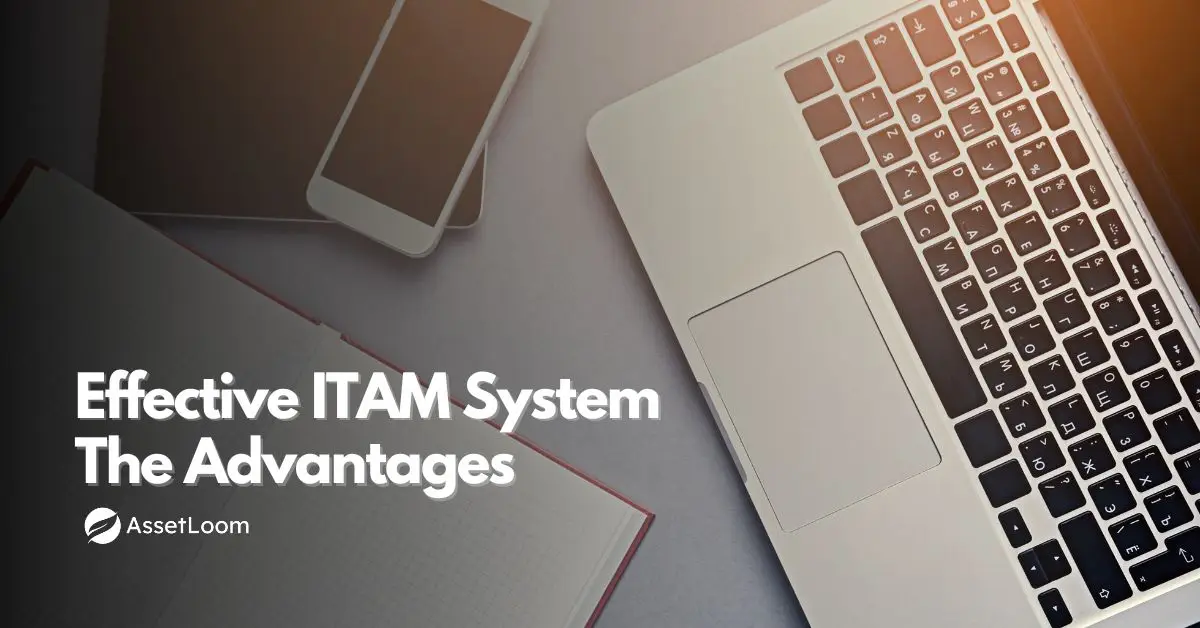Top Tools for Managing Contract Expiration Reminders in 2025
Discover the top 5 tools for managing contract expiration reminders in 2025. Learn about their features and which is best for your business.
Missing a contract renewal can cause service interruptions, unexpected expenses, or legal issues. Tools that send contract expiration reminders help by providing timely notifications and keeping contracts organized in one place. After reviewing several options, Here are the best five tools to help you decide which one fits your business needs.
1. AssetLoom
AssetLoom is a platform for managing contracts and assets, built to handle software licenses and agreements for organizations of all sizes. It excels at sending automatic contract expiration reminders. More significantly, it integrates with project management tools like Jira to make follow-up tasks easier.
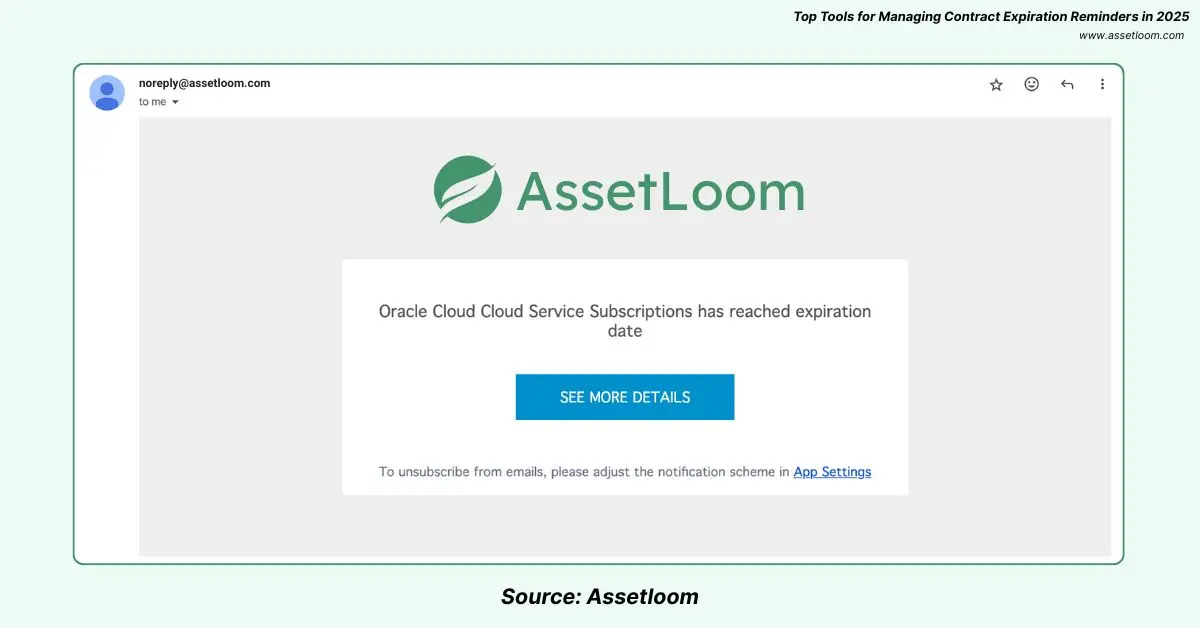
Best For: Organizations of all sizes, from small startups to large enterprises, or companies using Jira that need a strong, automated way to manage contracts and licenses.
Related article: The Importance of Software License Management for Businesses
Key Features:
- Automatic Notifications: AssetLoom sends alerts through emails when a contract or license is nearing its expiration or termination date. For example, you can set notifications for 30, 60, or 90 days before the deadline, ensuring you have ample time to act.
- Jira Task Creation: A key feature is its ability to automatically create Jira tickets or tasks when a contract is close to expiring. Specifically, you can set rules to assign these tasks to team members, include contract details, and adjust priority levels, so the work fits directly into your existing project system. This ensures nothing slips through the cracks.
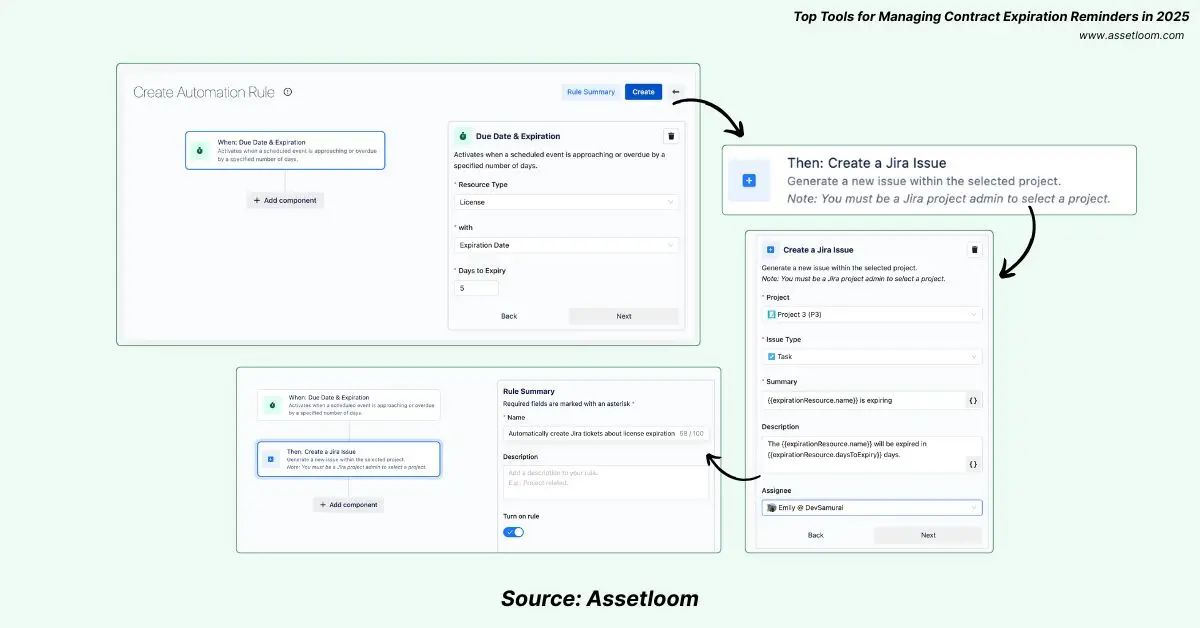
- Centralized Contract List: All contracts are well managed on a list. Additionally, the system allows you to tag contracts with details like type, vendor, or renewal date, which makes finding and organizing agreements straightforward.
- Custom Automation Rules: You can create rules to handle repetitive tasks. For instance, you might set up contract expiration reminders to go to multiple team members, update contract statuses automatically, or trigger actions like starting renewal discussions, saving time and effort.
- Access Control: You can set permissions to control who sees or edits sensitive contract information, ensuring security and proper access management.
Advantages:
- The Jira connection makes it easy for IT teams to manage tasks within a tool they already use, reducing the need for extra steps.
- Custom rules give you control over how reminders and tasks are handled, which is useful for specific workflows.
- The searchable database and reports help keep track of contracts and meet compliance needs effectively.
Disadvantages:
- Businesses with only a few contracts might find AssetLoom’s features more than they need, as it’s designed for more complex setups.
- Setting up advanced automation rules might take time for people who aren’t familiar with technical tools, although support is available.
2. Juro
Juro is a platform that uses AI to manage the entire contract process, designed for legal and business teams. It tracks expiration dates and supports contract creation and teamwork.
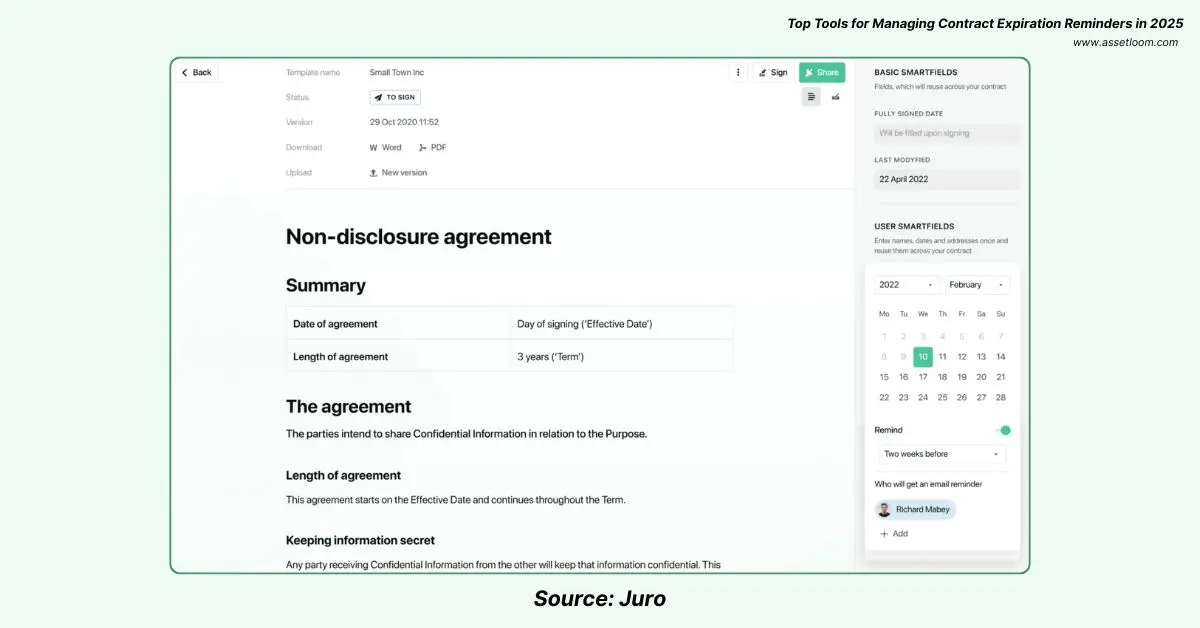
Best For: Legal teams or growing businesses that need a full contract management system with reliable reminders and teamwork features.
Key Features:
- Expiration Notifications: Juro sends email alerts for contracts nearing expiration, with options to set when you want to be notified (e.g., 30 or 60 days before). A dashboard shows all contract statuses—active, pending, or expiring—with filters to sort them.
- AI Data Extraction: Juro’s AI pulls out key contract details, like expiration dates, parties, or clauses, so you don’t have to enter them manually. This makes contracts easier to search and manage.
- Team Editing: A browser-based editor lets multiple team members work on contracts at the same time, with version tracking to see changes and comments.
- Integrations: Juro connects with Slack, Microsoft Teams, Salesforce, and other CRMs, so you can get notifications or update contracts within tools you already use.
- Contract Analytics: The platform provides reports on contract details, like how often contracts are renewed or how long negotiations take, to help with planning.
- eSignature Support: Juro includes built-in eSignature tools, making it easier to sign renewals or new contracts.
- Custom Workflows: You can set up rules to automate tasks like sending reminders or routing contracts for approval.
Advantages:
- The AI features save time by automatically pulling out important contract information.
- The team editing tools make it easier for groups to work on contracts together.
- Connections with other tools make it flexible for different business setups.
Disadvantages:
- Some users mention that email notifications can sometimes be delayed, so you might need to check manually.
- More advanced features, like detailed reports, may only be available in higher-priced plans.
3. Contract Hound
Contract Hound is a simple tool made for small businesses and non-profits. It focuses on basic features to track contract expirations without complicated setups.
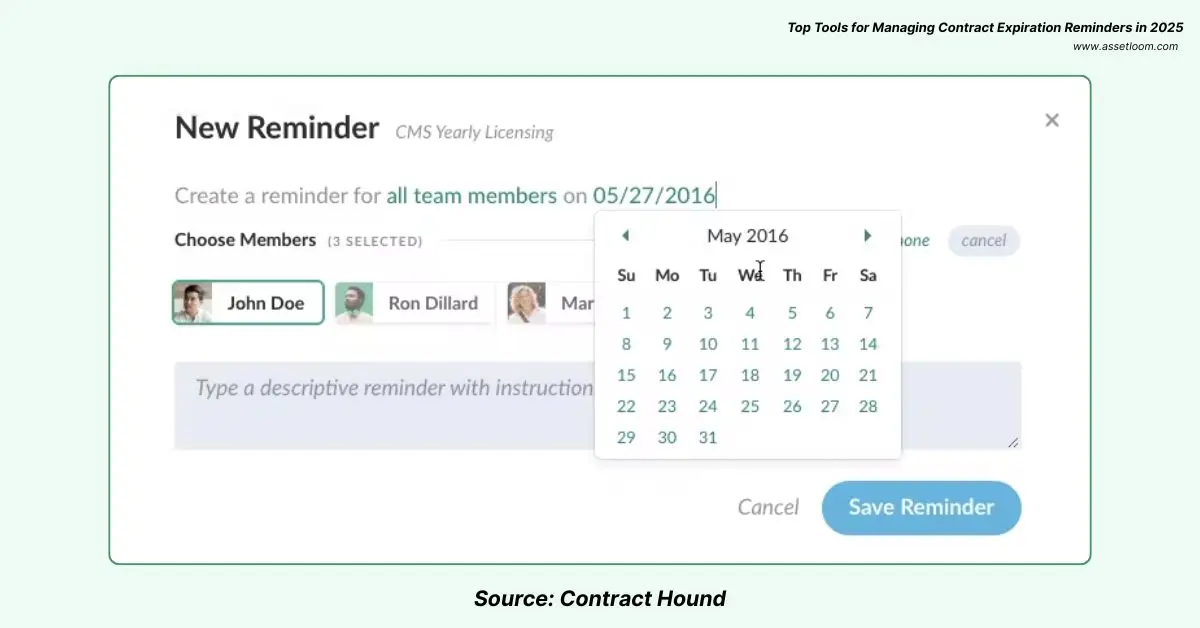
Best For: Small businesses or non-profits that need a simple, low-cost way to track contract expirations.
Key Features:
- Email Notifications: Sends automatic email alerts 30 days before a contract expires, with options to send to multiple team members. The platform is working on adding SMS notifications for more flexibility.
- Easy Contract Uploads: You can upload contracts using a drag-and-drop interface, supporting common file types like PDF or Word, which makes setup quick.
- Approval Processes: Allows you to set up simple approval steps for contract renewals or changes, with notifications sent to the right people when action is needed.
- Centralized Storage: Contracts are stored in a secure, cloud-based system with basic search options based on contract name, date, or vendor.
- User Permissions: You can control who sees or edits contracts by setting access levels for team members.
- Basic Reports: Creates simple reports on contract statuses and upcoming expirations, useful for small-scale tracking.
Advantages:
- The platform is easy to use and set up, even for people with little technical experience.
- Its low cost makes it affordable for small businesses and non-profits.
- Users often rate it highly for being simple and straightforward.
Disadvantages:
- It doesn’t have the advanced automation or connections to other tools that AssetLoom or Juro offer.
- Businesses with complex contract needs might find it too basic.
4. Expiration Reminder
Expiration Reminder is a tool focused on tracking expirations for contracts, licenses, and certifications. It’s popular in industries like healthcare and education, where meeting regulatory standards is important.
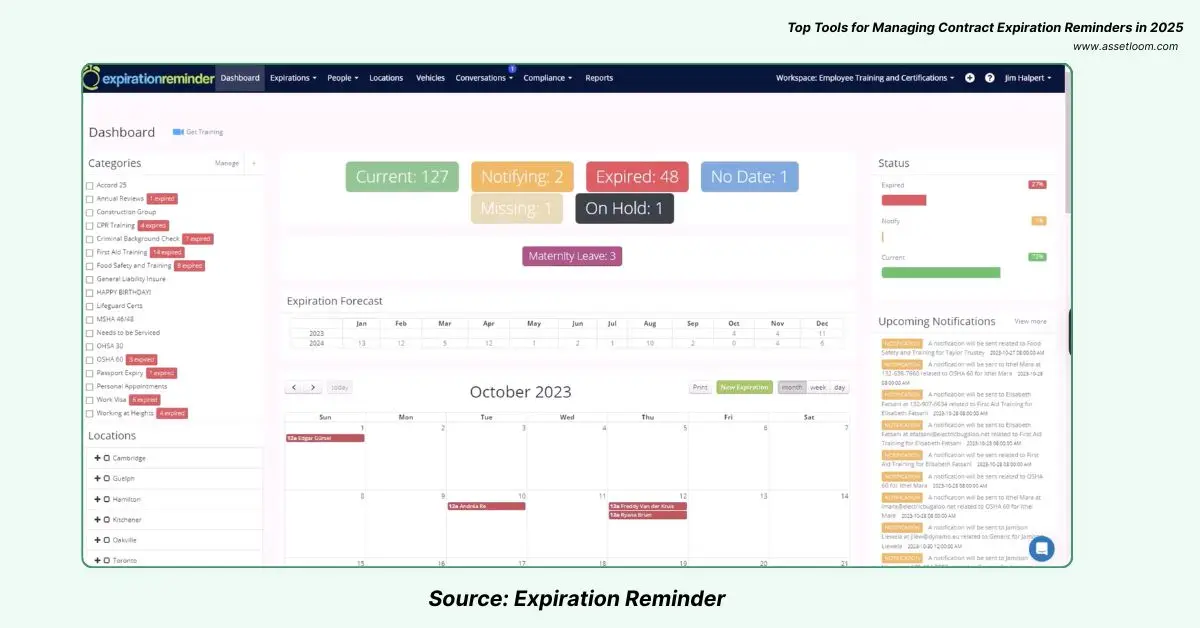
Best For: Businesses in regulated industries, like healthcare or education, that need reliable expiration tracking and compliance support.
Key Features:
- Custom Notifications: Sends email alerts for expirations, with options to set when you want to be notified (e.g., 15, 30, or 60 days). The dashboard shows current, expiring, and expired items, with color-coded markers for quick review.
- Compliance Reports: Creates detailed reports for audits, meeting standards like HIPAA or GDPR, with options to export in PDF or CSV formats.
- Data Import: Allows you to upload contract data from Excel or CSV files, making it easier to manage large numbers of contracts.
- Integrations: Works with ERP, CRM, and financial systems like QuickBooks or SAP, so expiration tracking fits into your broader business processes.
- Mobile Access: Includes a mobile app for iOS and Android, letting you check contract statuses and receive notifications on the go.
- Multi-Document Tracking: Manages not just contracts but also certifications, licenses, and other time-sensitive documents in one place.
Advantages:
- Strong compliance features make it a good fit for industries with strict regulations.
- The dashboard gives a clear view of expirations for the year ahead.
- A 14-day free trial is available without needing payment details.
Disadvantages:
- Its automation features aren’t as advanced as AssetLoom’s, so some manual setup may be needed.
- It doesn’t offer much for contract negotiation or teamwork compared to full contract management platforms.
5. ContractWorks
ContractWorks is a cost-effective contract management tool that offers a balance of usability and features, including expiration reminders and contract collaboration, suitable for businesses of different sizes.
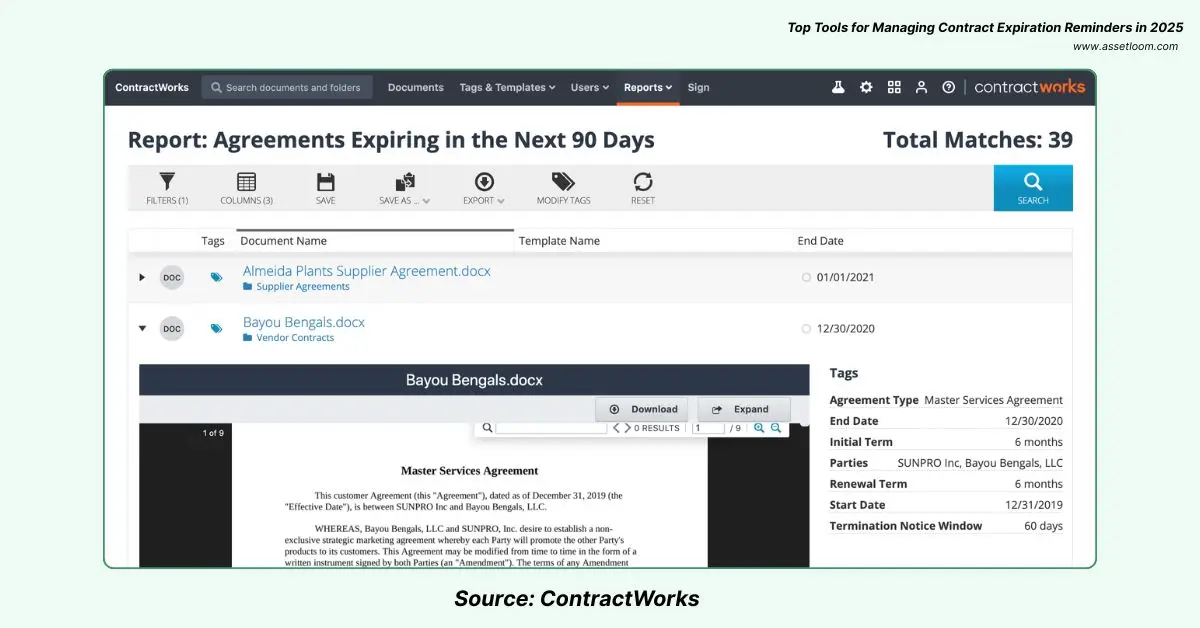
Best For: Businesses looking for an affordable, easy-to-use contract management system with reliable reminders and teamwork features.
Key Features:
- Renewal Notifications: Sends customizable email alerts for contract renewals and important dates, with options to adjust when and to whom notifications are sent.
- AI Contract Analysis: Uses GPT-3 to simplify complex contract language, highlight key terms like expiration dates, and suggest clauses for new contracts.
- Team Editing: Offers a browser-based editor for real-time contract changes, compatible with Microsoft Word, with version control to track edits.
- Secure Storage: Provides SOC 2-compliant storage with full-text search, metadata tagging, and audit trails for compliance and accountability.
- Custom Dashboards: Lets you create personalized views of contract data, such as upcoming expirations or contracts by vendor, for better organization.
- Reporting Tools: Generates detailed reports on contract statuses, renewal trends, and compliance metrics, which can be exported for reviews.
Advantages:
- Easy to set up and use, with quick contract approval processes.
- More affordable than many other large-scale contract management tools.
- Works well for both small and larger businesses.
Disadvantages:
- Advanced reporting and analytics may require more expensive plans.
- Doesn’t include built-in eSignature tools, so you’ll need to use a separate service like DocuSign.
Choosing the Right Tool
Choosing a contract expiration reminders tool depends on your business needs:
- Business Size and Needs: Small businesses may prefer Contract Hound’s simplicity, while larger companies might choose AssetLoom or Juro for their advanced features.
- Connections to Other Tools: AssetLoom’s Jira integration is great for IT teams, while Juro and ContractWorks work well with CRMs and communication platforms.
- Budget: Contract Hound and Expiration Reminder are lower-cost options, while AssetLoom and Juro may cost more for their full feature sets.
- Compliance Needs: Expiration Reminder and ContractWorks are strong for industries with strict regulations due to their reporting capabilities.
- Ease of Use: ContractWorks and Contract Hound are the easiest to start using, while AssetLoom and Juro offer more features for complex needs.
Conclusion
Contract expiration reminders are essential to avoid disruptions and meet compliance requirements. AssetLoom is the top choice because it combines reliable reminders with automatic task creation in Jira, and its features work for organizations of all sizes, from small startups to large enterprises. Juro and ContractWorks offer full contract management systems for teams needing collaboration, while Contract Hound and Expiration Reminder are better for smaller businesses or those with compliance needs. By choosing the right tool, you can stay on top of deadlines, reduce risks, and keep contracts organized in 2025.

Subscribe for Expert Tips and Updates
Receive the latest news from AssetLoom, right in your inbox.
